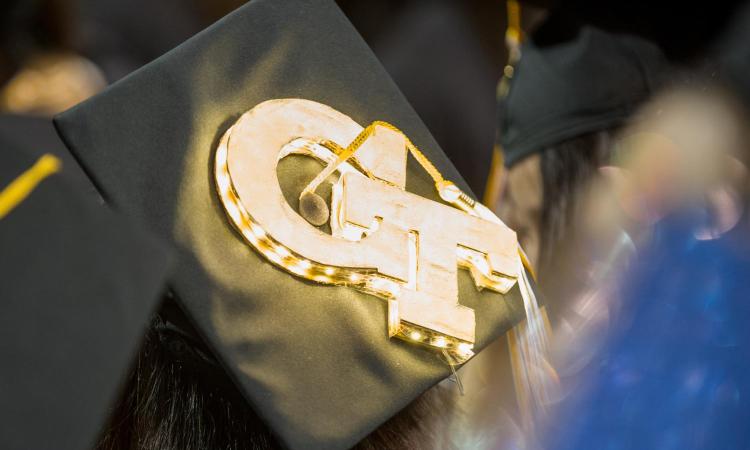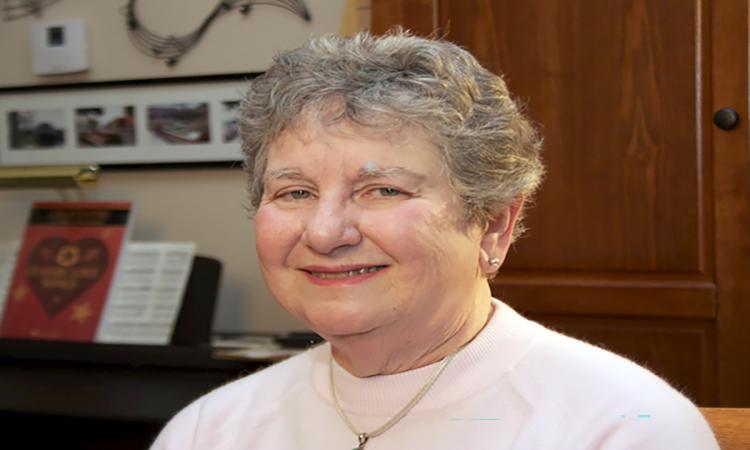Celebrating women taking it to the next level.
The Daniel Guggenheim School of Aerospace Engineering salutes the first women at Georgia Tech to earn graduate degrees in aerospace engineering: Laurie L. Baker (BSAE 1967, MSAE 1968), Joyce E. Carpenter (BSAE 1972, MSAE 1978), C. Anne Patterson (BSAE 1971, MSAE 1975), and Mary A. Wright (BSAE 1964, MSAE 1966, and Ph.D. AE 1970). Despite the times and social climate, these women pushed boundaries and obtained their educational goals when it was rare for women to pursue engineering. They shared their experiences to inspire future generations to “go for it.” The overarching theme among them was that graduate school was a challenge, but not anything that they couldn’t handle. They all agreed that Georgia Tech was tough and rigorous, but they all appreciated it because it prepared them to soar into their futures.
Laurie Baker
Why did you pursue a graduate degree, and why GT?
I loved school. I could go to school forever. My parents always instilled in us the need to go to college because my parents wished that they had more education. My mother was very supportive of everything I did. I chose Georgia Tech for graduate school because it was where I earned my undergraduate degree, and it was the line of least resistance. I was already successful there and had friends too. I made great friends there while earning my undergraduate degree, so it made sense.
What was the biggest hurdle you had to overcome as a female graduate student?
Probably the biggest hurdle was between the time when I got my bachelor's degree and I got my master's degree. It wasn’t just for women it was for everyone. Aerospace industry jobs dwindled. It affected a whole bunch of my friends. Many of us stayed to get our master’s degrees. I can't remember how many job offers we got when we were getting a bachelor's degree, but with virtually any company we interviewed with, we got an offer. There were a lot fewer companies that came on campus the next year and they were much more selective. And so, I think that was the biggest challenge. I can’t remember a big hurdle academically. Although, housing was a challenge. It was always a battle to find a roommate and an apartment close enough to campus. You had to room with whoever was available, and find a place that you could afford. Also, when I was at Tech, we were not allowed to wear slacks to class unless they predicted below-freezing for the day. We didn’t see that as a hurdle; it just was the norm. When we went to Freshman camp the upper-class girls let us know what the rules were.
What lessons did you learn while earning your Bachelor of Science degree in a male-dominated field that you would take with you into your graduate degree?
I learned how to study for a start because in high school, I really didn't have to study. I later learned that my high school was unaccredited, so it wasn't surprising that it was really hard when I got to Georgia Tech. I learned how to study, and that helped me in graduate school.
What advice would you give to other women who are pursuing an advanced degree in a male-dominated field?
What did you do with your graduate degree?

Laurie Baker courtesy of the Georgia Tech Alumni Association Living History.
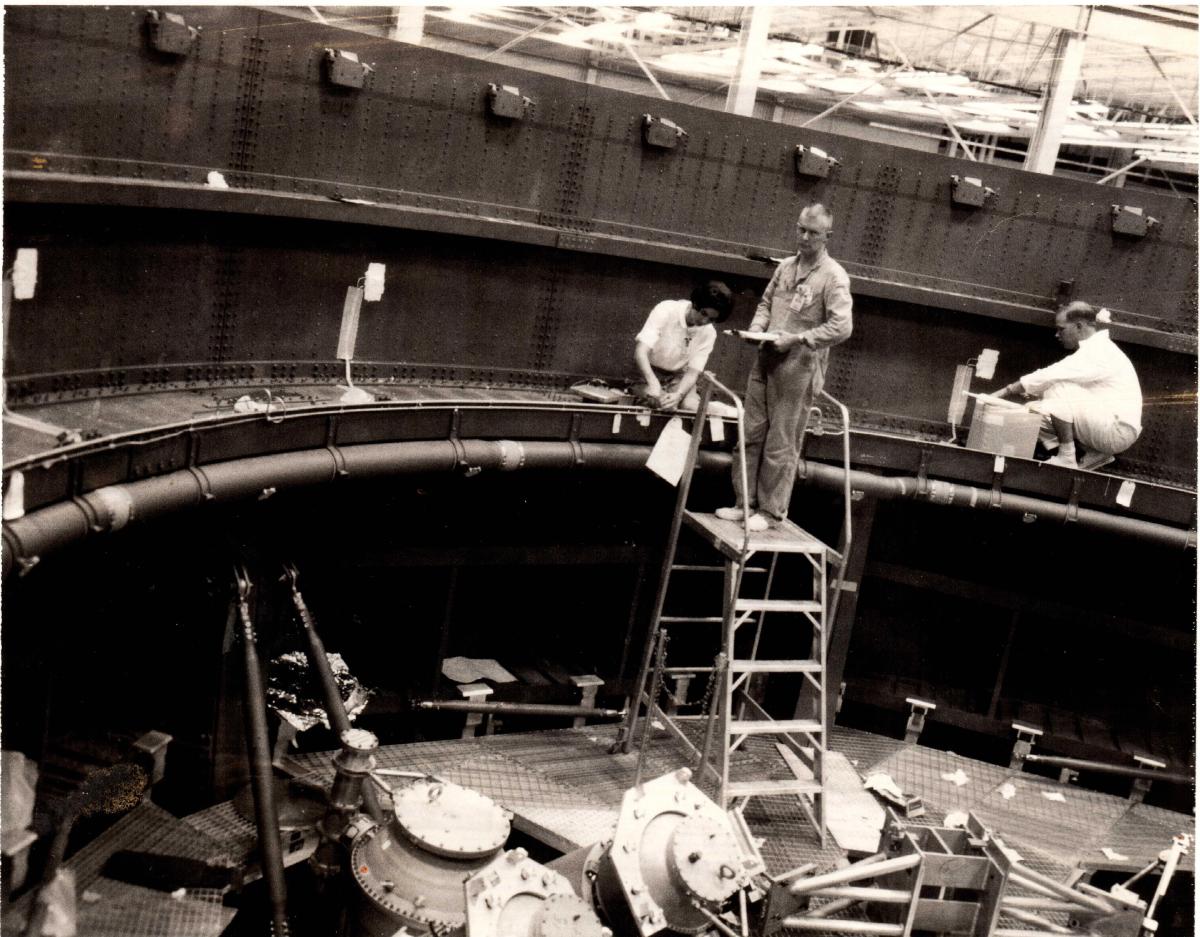
Laurie Baker working at NASA
Be slow to take offense.
Laurie Baker
(text and background only visible when logged in)
Joyce Carpenter
Why did you pursue a graduate degree, and why GT?
I was working at Lockheed Martin and, since they offered to cover tuition for engineers who wanted to pursue advanced degrees, I decided to go back to school. I earned my undergraduate degree at Georgia Tech, so I was familiar with it. I grew up in Sandy Springs, Georgia, and my father was a Georgia Tech graduate. My father was proud that I’d chosen Georgia Tech. He said that he always hoped that he would sit with one of his children at Georgia Tech orientation, but he didn't think it was going to be his daughter.
When I was ten years old, the space program started—the Mercury Space program to be exact. I remember my teacher brought in a television on a stand, and we watched the 15-minute suborbital flight from start to finish. I was hooked. I was already into science fiction, but I was enraptured by the space program the entire time I was in high school and then in college. When I got out of school, I wanted to be an astronaut, but I realize now, in hindsight, that I wanted to be a colonist on the moon. I wanted to be one of the first settlers in a lunar colony.
What was the biggest hurdle you had to overcome as a female graduate student?
In graduate school, making up the time that I missed from work at Lockheed Martin was my biggest hurdle. In effect, I was working full time and taking classes. I felt very accepted by my colleagues at work, so it was really the time commitment that was a challenge.
What lessons did you learn while earning your Bachelor of Science degree in a male-dominated field that you would take with you into your graduate degree?
As an undergraduate, I wasn’t sure if I could actually pass the courses. I was unsure of myself. I brought confidence to my graduate studies that I didn’t have as an undergraduate. I knew I could handle the curriculum because I’d done well as an undergraduate. I believe being in the male-dominated program at Georgia Tech gave me a lot of confidence. It toughened me up for graduate school and my career. Georgia Tech is tough, it’s like going through boot camp and it’s a rigorous experience, but it toughened me up for graduate school and future jobs.
What advice would you give to other women who are pursuing an advanced degree in a male-dominated field?
If you’ve earned your bachelor’s degree and are pursuing a graduate degree, you have what it takes to be successful. Own it and work with confidence. Work hard and know that you can do it. I became friends with my fellow students; most of the men my age were very accepting. We met on common ground and on equal footing. Look for that space working with colleagues who respect and value you and realize that you do deserve to be there.
What did you do with your graduate degree?
I was already working at Lockheed Martin, so I continued there. I was working on structures and materials and most of my work consisted of doing structural analysis on repairs to the C130 aircraft. My specialty for my master’s was structures and materials so that was why I chose that field rather than aeronautical specialization. But after about two or three years in structures at Lockheed, I changed to the Advanced Design Department and found that I loved that work much more. I was working on the very front end of the definition of an aircraft rather than the tail end repairing them. I went on to work at NASA Johnson Space Center in Houston, Texas. I loved it. In the early 1990s, we revisited the original plans to send people back to the moon to establish a base there and send people to Mars. Literally “blue-sky” stuff, dreaming up what scientists would want to do on the Moon and Mars, understanding the capabilities it would take so the astronauts could work comfortably and live. I’m glad to see NASA is still working toward it. I retired from NASA about 15-16 years ago and am living in Asheville, North Carolina.
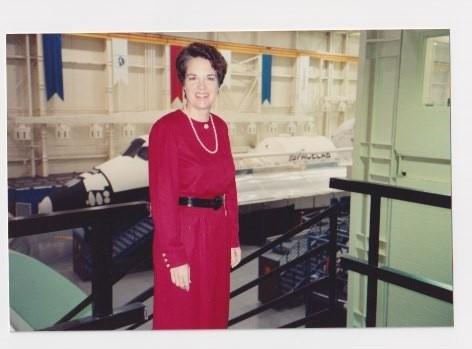
Joyce Carpenter, NASA Johnson Space Center in Building 9 overlooking the Space Shuttle orbiter full-scale fuselage trainer.
I believe being in the male-dominated program at Georgia Tech gave me a lot of confidence. It toughened me up for graduate school and my career.
Joyce Carpenter
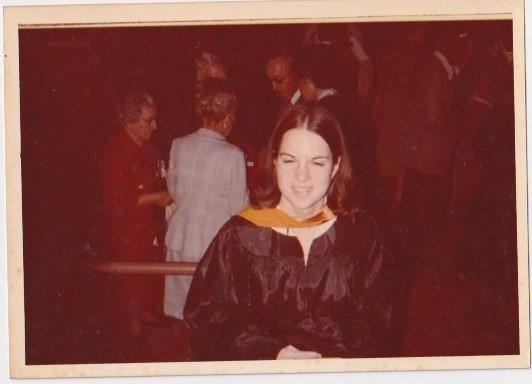
Joyce Carpenter, MSAE graduation 1978
(text and background only visible when logged in)
Dr. Anne Patterson
Why did you pursue a graduate degree and why?
When I was at NASA Goddard Space Flight Center, I was thinking about graduate school and what I should do. I flew home to Florida. My father picked me up to drive the rest of the distance home. We were driving from Jacksonville to Ocala, where we lived. It was a stormy starless night. All of a sudden, we saw a horse loose on the road. We went from lane to lane to avoid the horse, but it kept coming. Ultimately, it ended up going through the windshield. I still have the scars. My father held the wheel tight to steady the car. His hands were badly damaged from the proximal phalanx back and he had to have reconstructive plastic surgery on them at the University of Florida (UF). He was in the hospital for a long time due to multiple surgeries and a long rehabilitation I went back and forth while he recovered. One day, I walked into the UF medical school and got a brochure. I decided that I wanted to get my master’s and take pre-med courses to become a physician ultimately. I knew that I wanted to do both.
What was the biggest hurdle you had to overcome as a female graduate student?
My father was a Georgia Tech graduate and a man of few words. When I shared with him that I wanted to attend Georgia Tech, he took me to meet Dean George Griffin who was still dean of students. Dean Griffin had a fascinating office full of pictures and artifacts. He was leaning back in his chair with his feet on his desk, wearing his hat pulled down over his eyes speaking on the phone. When he realized there was someone in the room, he looked up and told the person on the other line that he had to go. He slammed the phone down and said, “John, where in the hell have you been for the past 50 years?” It was the first time I heard that my father and the dean had been roommates at Georgia Tech. Plus, the dean and my father had worked with my great-uncle when they were younger, building the railroad that pulled barges through the Panama Canal. The dean asked what we were doing there, and my father said that his daughter wanted to attend Georgia Tech. The dean said, “Why would you want to do a thing like that?” “I want to be an engineer. I really want to come to Georgia Tech,” I said proudly. He tried to discourage me saying that women were not well received here. I was not deterred; Tech was the only school that I applied to. His prediction was true in my first two years. I’d often sit in the big auditoriums and there would be a C-shape of empty seats around me. The men would not sit next to me. Luckily, that was not the case when I came to the School of Aerospace Engineering.
What lessons did you learn while earning your Bachelor of Science degree in a male-dominated field that you would take with you into your graduate degree?
I didn’t let other people’s issues and opinions deter me from earning my degree or pursuing my goals. I was a woman on a mission, and if they had a problem with me being a woman, that was their problem, not my problem. I allowed myself to chase my dreams.
I also learned to keep a good sense of humor. One day we were taking a test in my aerodynamics class. I was the only female in the class. We were all working until the last second to finish the test. I had turned my paper in, but there were people still working like mad to finish in time. One of the students said, “Okay girls, turn your papers in!”
I said, “I have.”
The whole class broke into laughter and then turned in their papers. I learned that if you have a good sense of humor, you can get through anything. You can’t wear your emotions on your shirt sleeve. That’s not engineering. As early women in aerospace engineering, we were all very dedicated and we all had a pretty good sense of humor. And we all had a good dose of common sense in how you get it done. I took this attitude into graduate school and throughout my career.
What advice would you give to other women who are pursuing an advanced degree in a male-dominated field?
I learned at Tech that you could accomplish everything you wanted to, but you might just need to do it at a different pace or in a different way.
I have often said to others, "you have to learn to pace yourself and space yourself so you can accomplish all that you need to do or want to do."
Meaning that you can get distracted by lots of other things and often try to do too much at once and not really achieve what you want to because you have become far too scattered trying to do it all at once.
You may be able to do it all, but you have to space it or pace it differently, and that it's OK. You just need to give yourself permission to do it in a different way than what the world might expect at that moment in time.
Be a good team member, get to know your peers, work hard, and have a good sense of humor, and you will go far. I enjoyed my college life. I went to football games, and I was even asked to be in a sorority, but I declined because I didn’t want to be distracted from my studies. I made friends and was well-rounded, even though I was pretty shy.
Everybody, no matter who you are, where you are, what you're doing, you're going to have hardships. Life isn't always easy. Life isn't always fair. Well, that's life. You have to be strong and face what you have to face and figure out ways to work through it.
One quote that always inspired me was from von Goethe (1749 - 1832), "Whatever you can do or dream you can, begin it; Boldness has genius, power, and magic in it."
It was on a poster printed by the Sierra Club showing several climbers ascending the west ridge of Mount Everest. A fellow engineer had it over his desk at NASA. I had long admired it and often commented that it was a wonderful representation and saying. When I was leaving to go to graduate school and then medical school, he gave it to me. It has always been over my desk or in my office. It is in my office, prominently displayed today.
What did you do with your graduate degree?
I worked briefly at Lockheed-Martin after completing my master’s degree and before starting medical school. I went to medical school at Emory University School of Medicine and did my residency in obstetrics and gynecology and my fellowship in maternal-fetal medicine. I also studied at the University of Oxford.
I was on the faculty in gynecology and obstetrics at Emory University and conducted fetal research at the Yerkes Primate Research Center. After that, I went to Northside Hospital in Atlanta and was their first board-certified maternal-fetal specialist. I also had a private practice.
One day, I was at a traffic light praying about something that was heavy on my heart. God spoke to my heart, and let me tell you, that gets your attention. I heard, “I took you to medicine because that's where I want you. And that's what I want you to do.” My concern was resolved, and I realized this is what He sent me to do.
About thirteen years ago, I started a company, Women’s Telehealth, to provide maternal-fetal medical care to places that don’t offer those services. Our goal is to take high-risk obstetric care to women in small or rural communities who otherwise would never have this kind of care. We have also found that some larger communities often need this type of care too. Remotely, we do high-resolution ultrasound scans through hospitals, doctor’s offices, government clinics, or health departments with the equipment available. We train sonographers and we have a learning library. They have to pass the modules and we often take people who are general obstetric sonographers, and we train them up. It takes time for them to be properly trained, but it allows us to do the sophisticated scans needed, including live scans. We are now licensed in 20 states. To put all of the needed pieces in place to accomplish this type of care has required that I use a lot of the systems engineering I learned at Tech.
So, I love engineering and I love medicine. And I really did marry the two with Women’s Telehealth.
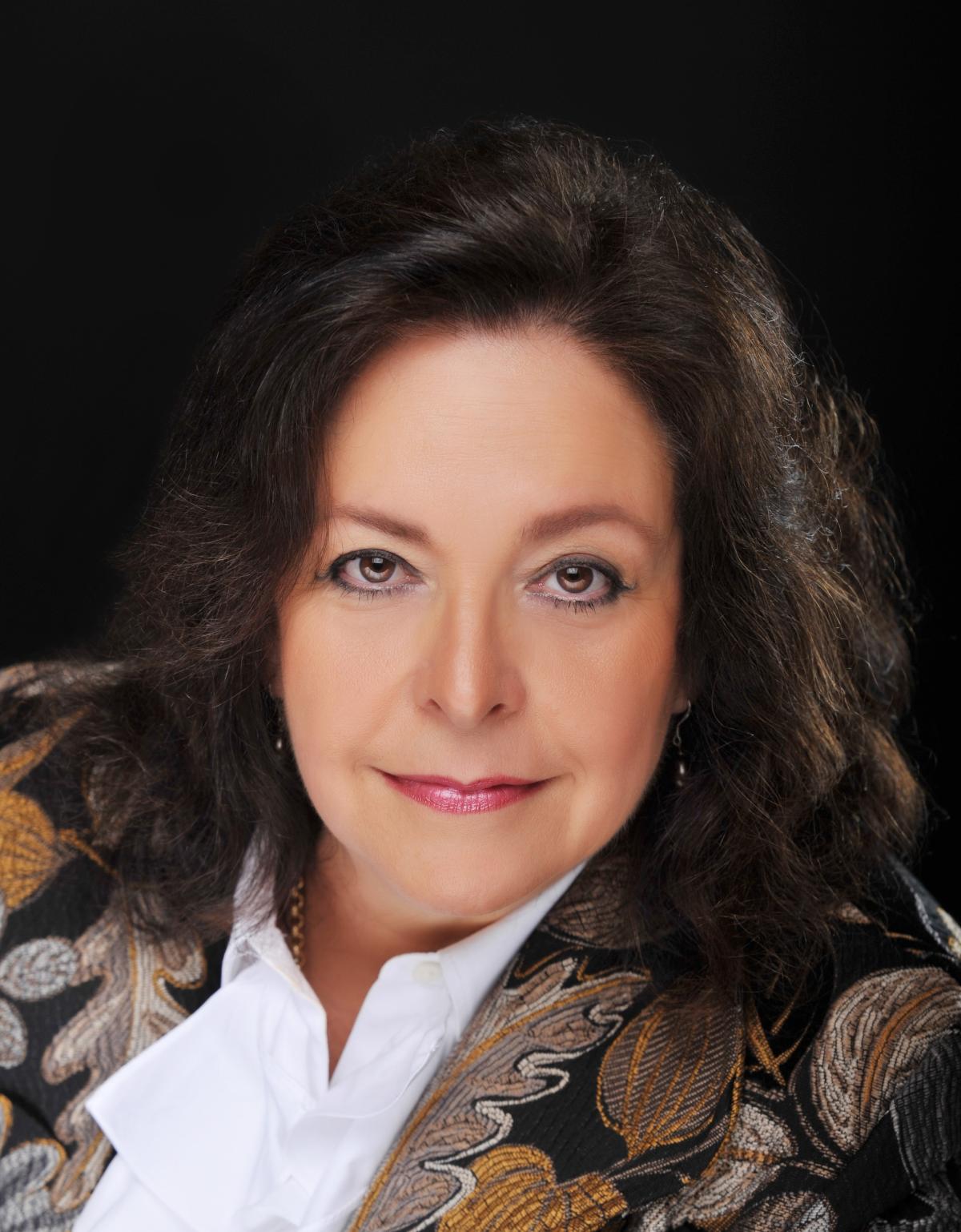
Dr. Anne Patterson
AE Mentor in Residence
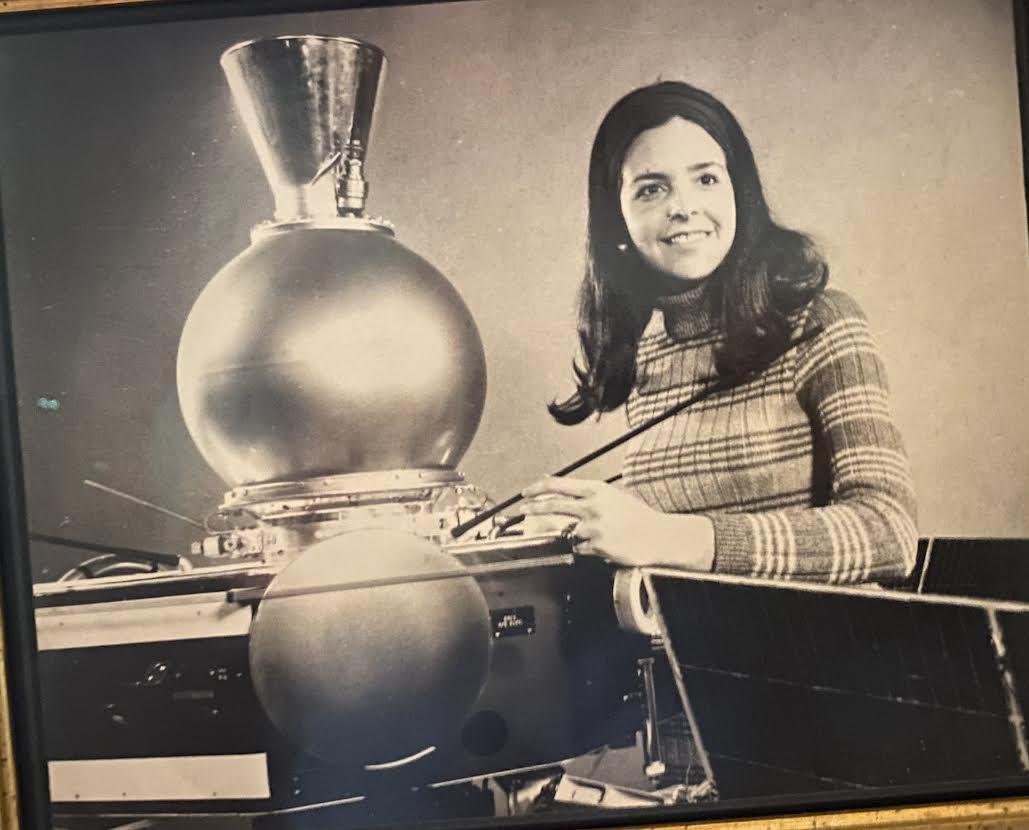
Anne Patterson with mock-up of satellite
You have to learn to pace yourself and space yourself so you can accomplish all that you need to do or want to do.
Dr. Anne Patterson
(text and background only visible when logged in)
Mary A. Wright
In 1970, Mary A. Wright, became the first female to earn a Ph.D. in aerospace engineering from Georgia Tech. The pioneer was featured in the 1970 Georgia Tech Alumnus special issue on Women in a man’s world, where she shared that she wanted to be an engineer as early as twelve years old. She overcame challenges that any student could encounter and reached her goals. She placed first in her undergraduate class of 58 aerospace engineers and in the top 2% of the entire graduating class at Georgia Tech. The article chronicles the Tennessee native’s journey to the Ph.D.
In 2013, she was featured in the Georgia Tech Alumni Association Living History program. She shared what it was like to come to Georgia Tech and some of the challenges she faced as a woman. It only took a few aerospace courses to let her know where she ultimately wanted to go. She liked mathematics, research, testing, and preferred fluid mechanics. Her graduate research focused on crosswinds. After finishing her master’s degree she pursued her Ph.D. in order to teach. After she earned her Ph.D., she taught at Purdue University in the Mechanical Engineering and Technology Department, where she earned tenure, and later taught at the University of Alabama at Birmingham.
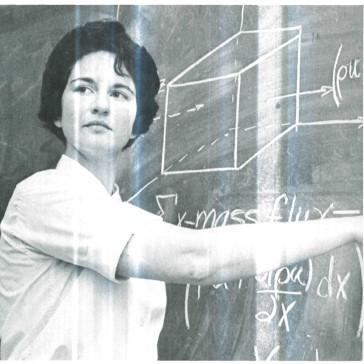
Mary A. Wright
courtesy Georgia Tech Alumnus, January-February, 1970
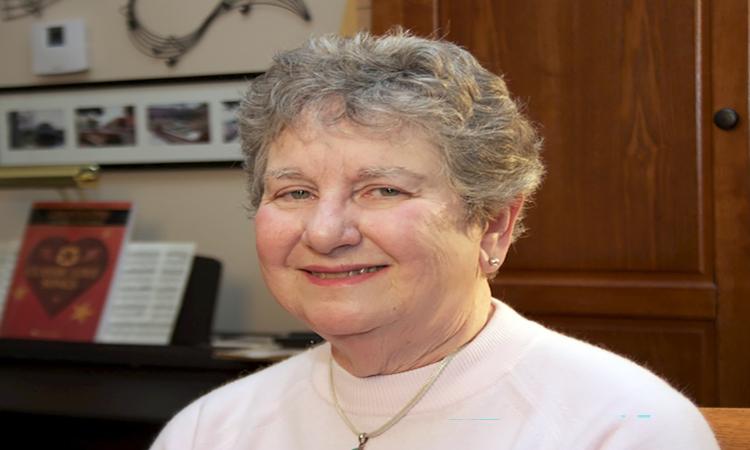
Mary A. Wright
Related Stories
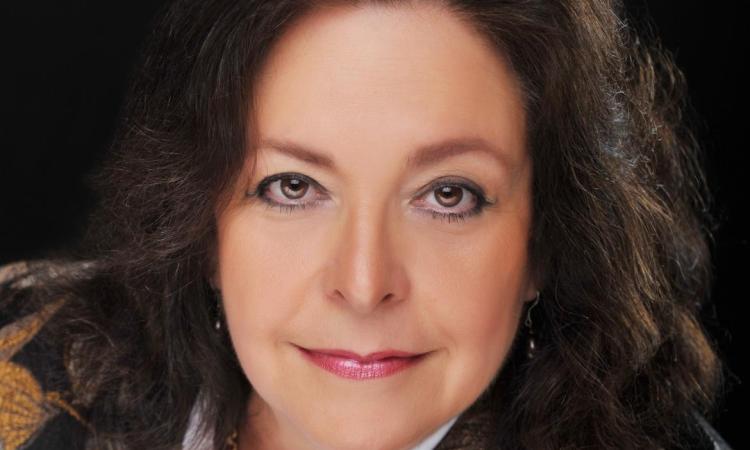
C. Anne Patterson: The Engineer Inside the Physician
